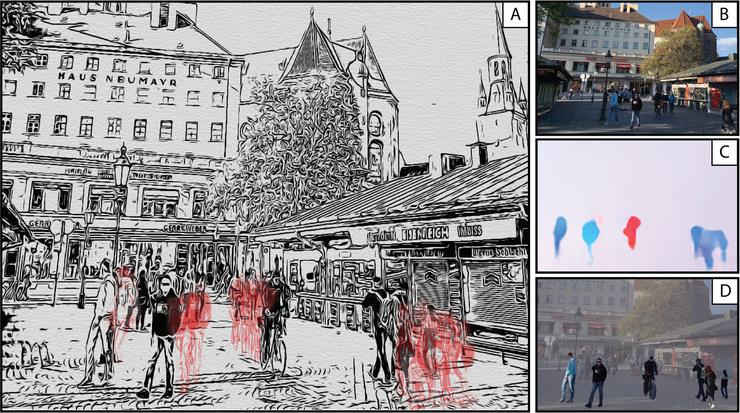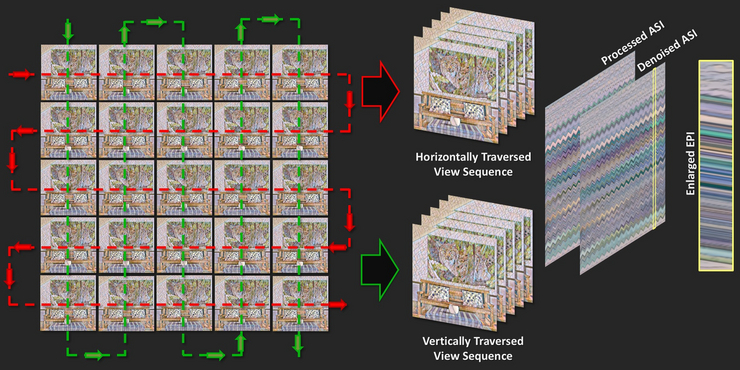Advanced Visual Media Enhancement (Wintersemester 2019/2020)
Dozent:
Dr. Matthias Trapp
(Computergrafische Systeme)
,
Sebastian Pasewaldt
(Computergrafische Systeme)
,
Sumit Shekhar
(Computergrafische Systeme)
,
Max Reimann
(Computergrafische Systeme)
Allgemeine Information
- Semesterwochenstunden: 4
- ECTS: 6
- Benotet:
Ja
- Einschreibefrist: 01.10.-30.10.2019
- Lehrform: Seminar / Projekt
- Belegungsart: Wahlpflichtmodul
- Lehrsprache: Deutsch
Studiengänge, Modulgruppen & Module
- HCGT: Human Computer Interaction & Computer Graphics Technology
- HPI-HCGT-K Konzepte und Methoden
- HCGT: Human Computer Interaction & Computer Graphics Technology
- HPI-HCGT-T Techniken und Werkzeuge
- HCGT: Human Computer Interaction & Computer Graphics Technology
- HPI-HCGT-S Spezialisierung
- OSIS: Operating Systems & Information Systems Technology
- HPI-OSIS-K Konzepte und Methoden
- OSIS: Operating Systems & Information Systems Technology
- HPI-OSIS-T Techniken und Werkzeuge
- OSIS: Operating Systems & Information Systems Technology
- HPI-OSIS-S Spezialisierung
- ISAE: Internet, Security & Algorithm Engineering
- HPI-ISAE-K Konzepte und Methoden
- ISAE: Internet, Security & Algorithm Engineering
- HPI-ISAE-T Techniken und Werkzeuge
- ISAE: Internet, Security & Algorithm Engineering
- HPI-ISAE-S Spezialisierung
Beschreibung
This project seminar aims at master students who want to extend their image processing, computer vision, and computer graphics skills regarding the analysis, planning, and development of GPU-accelerated image and video processing techniques for mobile, desktop and server systems. The course has mainly a project character and is subdivided into two parts:
The first part of the course is organized as a lecture series. The lecture topics are specified together with the seminar students and can include an introduction to the following basic concepts and foundations to:
- A short introduction into the field of image and video analytics,
- Techniques for image and video processing,
- Application development for mobile and Desktop/Server systems
Using specific image and video processing operations, the course teaches how fundamental processing techniques can be designed, developed and tested.

Figure 1: Multi-Dimensional Image Abstraction for Motion Depiction (https://dl.acm.org/citation.cfm?id=3329726)
In the second part of the course, participants will work individually, or as a team (max. 2 members), to implement assigned topics in the field of interactive image and video processing. Therefore, both a C++ and an Android or iOS framework will be provided. Possible topics for this project seminar cover the following domains (not limited to):
- Convolutional Neural Networks for image analysis and transformation*.
- Integration of interactive rendering techniques in 3rd party applications (e.g., Photoshop plugin).
- Implementation of interactive image stylization and editing tools for desktop systems.
- Service-based image and video-processing*
- Automated video summarization approaches to efficiently and effectively shorten videos*.
- Web-App development for service-based image- and video processing
Topics marked by a * are related to a joint research project of the Hasso Plattner Institute with Digital Masterpieces and the German Federal Ministry of Education. The research project investigates new concepts and techniques for automatic video abstraction.

Figure 2: Consistent Light-Field Filtering using Angular Slice Images (ASI) (https://diglib.eg.org/handle/10.2312/vmv20191326)
Voraussetzungen
- Successful completion of the lectures Computer Graphics I and/or II
- Basic knowledge of OpenGL and OpenGL ES Shading Language (GLSL) for image and video processing topics
- Basic knowledge/understanding of Neural Networks and/or Computer-Vision algorithms for image and video analysis topics
- For Service/Web-Apps development:
- Basic knowledge/understanding of Angular, Node.js, Java-Script or Docker
- Basic knowledge of Web-App development
- For Android mobile development:
- Basic knowledge of Java programming language
- An Android Device supporting OpenGL ES 3.0 or higher
- For iOS development:
- Basic knowledge of Swift development
- An Mac or MacBook, as well as an iOS device
- For Desktop development:
- Basic knowledge of C++ development
- Familiarity with Qt Lib
Literatur
- Mednieks et al., Android Programming, O’Reilly (or similar)
- Joshua Bloch, Effective Java, Online
- Topic-specific material will be provided throughout the course
Lern- und Lehrformen
Project seminar (4 SWS/6 ECTS)
Leistungserfassung
The final grade will be determined as follows:
- 50% Documented source code & prototypical application
- 15% Concept presentation (approx. 10 minutes)
- 25% Final presentation (approx. 25 minutes)
- 10 % Projectmanagement
If the students plan to work in a group (of maximum 2 students), the group will get one grade, instead of individual grades for each student.
Termine
The kick-off meeting will take place on 15.10.2019, 09:15, in H-2.58
The lecture will take place in the first 4 weeks (15.10. -15.11.2019)
Subsequently, the project part will start in an self-organized way. Appointments with the supervisor are coordinated with the individual supervisors.
The midterm presentation will take place in the week from 09.12.-20.12.2019.
Based on student’s voting, the final presentation will take place February/March 2020.
Zurück

